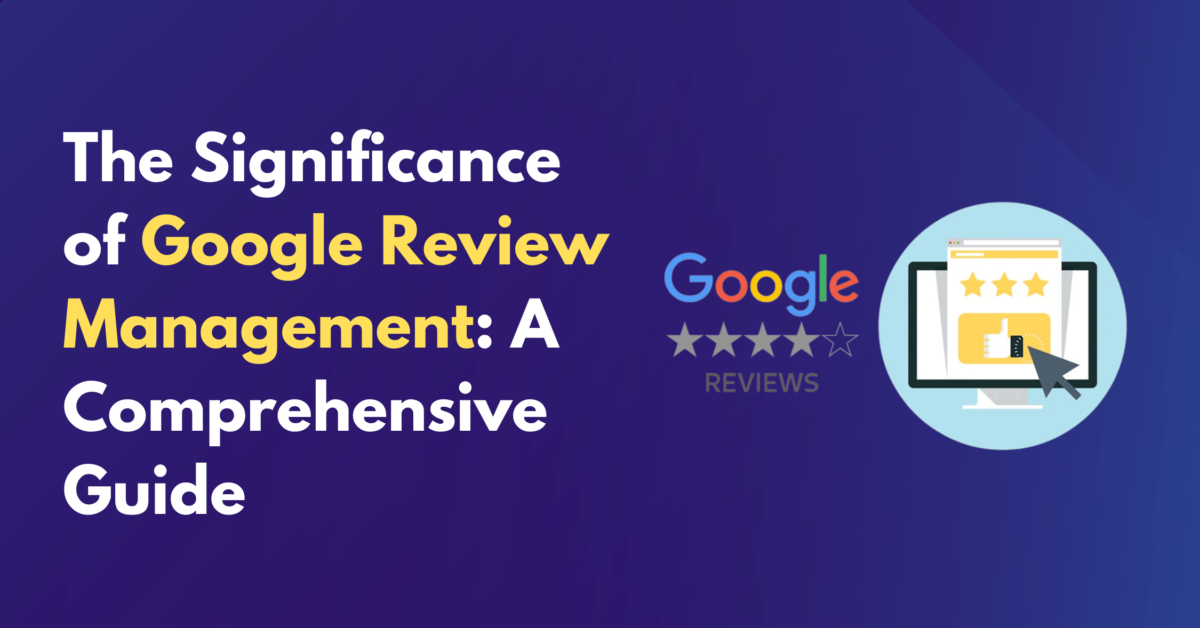The Significance of Google Review Management: A Comprehensive Guide
Keeping an eye on Google reviews is important for businesses. especially considering how easily a single unfavorable review can destroy your sales, reputation, and everything else you’ve worked so hard to establish.
We’ll go over the key ideas in Google review management in this article, such as
- Why it’s so important
- How to manage Google reviews
- Key Strategies for Effective Review Management
Why It’s Important to Manage Your Google Reviews
Gain Customer Trust and Credibility
Compared to advertisements, today’s consumers place far more trust in peer recommendations. Indeed, 78% of respondents say they believe in recommendations from peers, compared to 14% who believe in advertisements. Customers view online reviews as a form of peer recommendation, making them far more reliable than, say, advertisement copy.
Gathering positive reviews is a key component of Google review management. Your clients will be providing more and more reasons for potential customers to trust their company, product, or service as they accumulate more positive reviews. Positive testimonials for your company tell prospective customers, “Hey, this place is great!”
Since they demonstrate that you have successfully satisfied customers just like them in the past, they are a great Google review management tool for gaining the trust of prospective clients. But praise isn’t the only thing here.
You can increase your social media reputation and establish credibility by politely and quickly responding to unfavorable reviews. A simple apology can demonstrate your concern for a dissatisfied customer’s experience.
Improves Local SEO
The Google Business Profile of a company affects how highly that company appears in Google search results. That’s why any company that wants to be easily found online by its target audience should pay attention to Google Business Profile (formerly Google My Business) review management.
Positive reviews appear frequently and tell Google that a business is trustworthy and relevant, deserving of a prominent position in search results. Your SEO should improve as you take care of your Google reviews and accumulate a large number of positive ones.
In local search results, like those found on Google Maps, your business listing will appear higher the more positive reviews it receives. This incentivizes more local clients to get in touch with you and visit your establishment.
Also Read: Local SEO Strategies: How to Dominate Your Neighborhood Online
Boost Visibility
A Google Business Profile with plenty of reviews is more likely to catch the attention of online browsers, which is a must in a distracting, noisy online environment. Enhancing your clients’ online visibility can be facilitated by implementing a review management strategy.
Source of Feedback
Most people are aware of the Google review management concept, which states that reviews offer readers—who may include customers and prospects—valuable information. But Google reviews can also give businesses valuable, useful information.
Businesses should dedicate more time to promoting a feature or benefit that consistently receives positive feedback from customers. In a similar vein, if customers consistently voice their dissatisfaction in reviews, it gives the company valuable insight into areas in which they can enhance their offering.
Improve Customer Loyalty
Reacting to all reviews—positive or negative—is another essential component of Google review management. Reacting to reviews can increase the loyalty of both the original reviewer and any subsequent prospects who may come across it.
By answering, a company shows its clients that it respects their opinions and does not take them for granted. This is valid for both a brief thank-you note in response to a favorable review and a longer reply to a negative or critical review.
How to Manage Google Reviews
Keeping track of Google reviews is difficult, particularly for big companies with numerous locations. Keeping track of hundreds of reviews, responding quickly, and continuously analyzing all that data can be challenging.
The following are some tips for better Google review management.
Update all of Your Business Locations
Make sure Google has an accurate listing of all the information about your company. You don’t want to miss out on business opportunities or mislead prospects with inaccurate or out-of-date information.
Make sure that the addresses, phone numbers, and business hours listed on your Google Business Profile are accurate on a regular basis.
Include this as a regular monthly maintenance task for your company. How easy it is for customers to find you and get in touch with you can be greatly improved by taking this one small step.
Automate Google Reviews Using Software
When it comes to effectively managing reviews, automation tools can be revolutionary.
For example, you can program alerts for new reviews and automatically respond to frequently asked questions.
This guarantees that no feedback is overlooked and shortens response times. For instance, an automated system could be used by a retail store to flag unfavorable reviews for prompt attention and respond with a thank-you to all positive reviews.
Analyze Feedback
Don’t just read reviews and respond to them. Carefully examine them in order to glean insights that will aid in the enhancement of your company.
You can identify areas for improvement, identify trends, and identify opportunities for new features and products with the aid of customer feedback.
For instance, you may discover that a sizable portion of users are dissatisfied with your SaaS product because it is lacking a particular feature. You can increase customer retention, lower the amount of bad reviews, and raise customer satisfaction by implementing that feature.
Use Feedback as a Marketing Asset
Unbeknownst to you, Google reviews serve as social proof. Indeed, you can use them to generate leads and draw in new clients.
You can, for instance, proudly share the best reviews on social media, incorporate them into sales conversations, use them in advertisements, and display the best reviews on your website.
Solicit Reviews
Don’t be shy about asking for reviews. You have to evaluate and use a greater amount of data the more feedback you receive.
Send follow-up emails to customers, such as after a purchase, to encourage them to leave reviews for your company. To encourage them to submit feedback, you can also provide them with rewards like discounts.
Keep in mind to simplify the procedure as much as you can. Include links and calls to action that direct visitors to your review page.
Key Strategies for Effective Google Review Management
Effective review management involves more than just monitoring and responding to customer feedback; it requires a strategic approach to build and maintain a positive online reputation. Here are key strategies for effective review management in detail:
Provide Excellent Customer Service:
- Consistent Quality:
- Delivering a consistent, high-quality customer experience is the foundation of positive reviews. Ensure that your products or services meet or exceed customer expectations.
- Train Your Team:
- Train your staff to provide excellent customer service. Positive interactions with employees can significantly impact a customer’s overall experience.
- Empower Employees:
- Give your staff the freedom to find quick solutions to problems. When customers see immediate efforts to address concerns, it can mitigate negative reviews.
Proactively Seek Feedback:
- Surveys and Feedback Forms:
- Implement surveys or feedback forms to proactively gather customer insights. This not only provides a structured way to collect feedback but also helps identify areas for improvement before issues escalate.
- Incorporate Feedback Loops:
- Establish feedback loops within your organization, ensuring that customer feedback is shared with relevant departments for continuous improvement.
Respond Professionally and Graciously:
- Timely Responses:
- Respond to reviews promptly, whether positive or negative. Reacting promptly demonstrates your active customer engagement.
- Personalization:
- Personalize your responses by addressing the customer by name and referencing specific details from their review. This adds a human touch and demonstrates genuine appreciation.
Apologize and Offer Solutions:
- In the case of negative reviews, apologize for any inconvenience and offer solutions or steps you’re taking to address the issue. Accountability and a dedication to client satisfaction are demonstrated by this.
Utilize Feedback for Improvement:
- Analyze Trends:
- Regularly analyze trends in customer feedback to identify recurring issues or areas for improvement. This data-driven approach allows you to prioritize and address the most impactful issues.
- Internal Communication:
- Ensure that feedback is communicated internally, reaching relevant departments. This fosters a culture of continuous improvement and a customer-centric mindset.
- Implement Changes:
- Act on the insights gained from reviews by implementing changes to products, services, or processes. Communicate these improvements to customers to demonstrate responsiveness.
Promote Positive Reviews:
- Highlight Positive Feedback:
- Showcase positive reviews on your website, social media, or marketing materials. This boosts your online reputation and serves as social proof for potential customers.
- Ask for Reviews from Satisfied Customers:
- Actively encourage satisfied customers to leave positive reviews. By including clear instructions or links, you can streamline the process.
- Express Gratitude:
- When customers leave positive reviews, express your gratitude. Let them know that their feedback is valued and plays a crucial role in your business’s success.
Consistency in Responses:
- Develop Response Guidelines:
- Establish guidelines for responding to reviews to maintain consistency in tone and messaging. This is especially crucial if multiple team members handle review responses.
- Acknowledge Positive Feedback:
- Even with positive reviews, acknowledge the feedback and express appreciation. This reinforces a positive interaction and encourages customers to continue providing feedback.
Use Keywords in Responses:
- SEO-Friendly Responses:
- Incorporate relevant keywords into your responses to positive reviews. This can contribute to local SEO efforts, making it easier for potential customers to find your business.
- Showcase Local Relevance:
- Reference specific local details in your responses to further showcase your business’s relevance to the community.
By implementing these strategies, businesses can not only manage their online reputation effectively but also use customer feedback as a valuable tool for continuous improvement and growth. An integrated and strategic approach to review management contributes to long-term success and positive customer relationships.
If you need assistance managing your Google reviews, Metaloop marketing offers Google review management services that can help. We at Metaloop Marketing monitor your reviews, identify negative or neutral reviews, and work with your team to ensure that we have the right response to help rectify the issue and turn it into a positive one.



Write a Comment